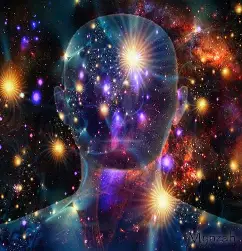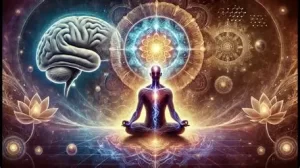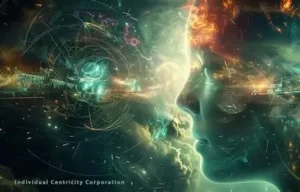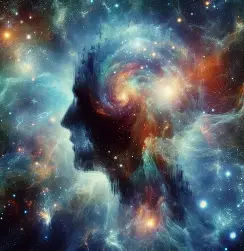Consciousness: Where Vedanta Meets Quantum Science
 In recent years, the study of consciousness has begun to step beyond the boundaries of philosophy and psychology into the realms of physics and neuroscience. I recently came across one of the most compelling voices in this dialogue, Federico Faggin, whose explorations into the nature of consciousness resonate deeply with both the timeless teachings of Vedanta and the discoveries of quantum science. As both a transpersonal psychologist and a follower of Sanatana Dharma, I see in these parallels not just an intellectual union, but an invitation to reimagine how we understand ourselves, our inner worlds, and our connection to the universe.
In recent years, the study of consciousness has begun to step beyond the boundaries of philosophy and psychology into the realms of physics and neuroscience. I recently came across one of the most compelling voices in this dialogue, Federico Faggin, whose explorations into the nature of consciousness resonate deeply with both the timeless teachings of Vedanta and the discoveries of quantum science. As both a transpersonal psychologist and a follower of Sanatana Dharma, I see in these parallels not just an intellectual union, but an invitation to reimagine how we understand ourselves, our inner worlds, and our connection to the universe.
Faggin, known for his pioneering work in microprocessor technology, has recently turned his attention to the mystery of consciousness. He suggests that consciousness is not a by-product of the brain, as materialist science often assumes, but rather the fundamental ground of reality itself. This perspective echoes the central insights of Vedanta, where Brahman — pure consciousness — is understood as the substratum of all existence.
In the Upanishads we read: “Consciousness is Brahman” (Prajnanam Brahma). This teaching affirms that consciousness is not produced, nor does it emerge from matter; rather, matter and mind arise within consciousness. Faggin’s hypothesis sits very closely to this ancient wisdom, reframing consciousness as the basis through which the physical world manifests, rather than something derivative or secondary.
Quantum theory offers an extraordinary lens to explore these parallels. At the quantum level, reality is not a fixed, objective “thing” but a field of probabilities and potentials, shaped by observation. The act of measurement collapses the wave function into a particle, suggesting that consciousness participates actively in shaping reality.
This closely resembles the Vedantic concept that the mind (manas) and awareness (chit) generate the experience of duality from the undifferentiated whole. The observer and the observed are not truly separate — they are facets of the same underlying unity.
Faggin suggests that consciousness “informs” the material world, giving it coherence and intelligibility. In my work as a transpersonal psychologist, I observe the same process reflected in human experience: it is consciousness that creates meaning, order, and narrative from the complexity of life.
Implications for Psychology and Spiritual Practice
From a therapeutic perspective, this understanding shifts the focus from treating the psyche as a closed mechanical system to viewing it as an expression of a larger, interconnected consciousness. Transpersonal psychology already embraces this holistic view — recognizing the spiritual dimension as integral to healing and growth.
Vedanta offers a practical framework for this realisation through practices such as meditation, self-inquiry (atma vichara), and devotion (bhakti). These practices do more than calm the mind; they dissolve the illusion of separateness and help us connect with the ground of consciousness itself. When a client comes struggling with fragmentation, anxiety, or loss of meaning, I often observe how reconnecting with this deeper foundation provides a profound sense of congruence and belonging.

What excites me most about the conversation between thinkers like Faggin and the sacred texts of Vedanta is the possibility of a shared language. For centuries, spirituality and science have often been separated without a sense of communality or resolution. Now, quantum discoveries and consciousness studies offer bridges.
When physics speaks of entanglement — that particles remain mysteriously connected across vast distances — Vedanta reminds us that all beings are linked within the web of Brahman. When science suggests that the observer influences reality, Vedanta points us toward maya — the play of perception that shapes our world. Both are saying, in their own tongue, that separation is an illusion.
As a follower of Sanatana Dharma, I do not see these connections as abstract; they are lived truths. In meditation, ceremony, and daily life, I remind myself that consciousness is both the journey and the destination. As a psychologist, I observe that healing occurs most profoundly when individuals awaken to their own inner witness — the unchanging awareness behind thoughts and emotions.
Perhaps this is the great gift of aligning Faggin’s vision, Vedantic wisdom, and quantum insights: a reminder that the journey toward understanding consciousness is not only about solving a scientific puzzle, but about living more fully, more connected, and more awake.

In the end, both ancient seers and modern scientists point us back to the same truth: we are consciousness itself — infinite, interconnected, and whole, or, as in the Vedanta tradition, truth, pure awareness, and bliss (Sat, Chit, Ananda).
Hari om Tat Sat.